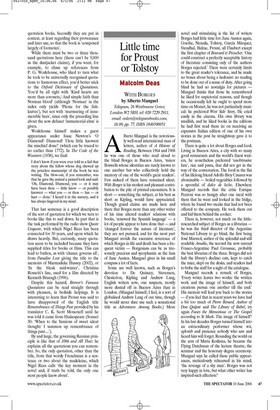Little time for Proust or Tolstoy
Malcolm Deas
WITH BORGES by Alberto Manguel Telegram, 26 Westbourne Grove, London W2 5RH, tel: 020 7229 2911, email: orders@telegrambooks.com, £6.99, pp. 77, ISBN 1846590051 Alberto Manguel is the notoriously well-read international man of letters, author of A History of Reading. Between 1964 and 1968 he was one of those who read aloud to the blind Borges in Buenos Aires, ‘minor Boswells whose identities are rarely known to one another but who collectively hold the memory of one of the world’s great readers’. Few indeed of them have remained silent. With Borges is his modest and pleasant contribution to the pile of printed encounters. It is short — something the subject, at his best as short as Kipling, would have appreciated. Though grand claims are made here and there that Borges more than any other writer of his time altered readers’ relations with books, ‘renewed the Spanish language’ — a lot of people appear to have done that — and ‘changed forever the nature of literature’, they are not pursued, and for the most part Manguel avoids the excessive reverence of which Borges in life and death has been a frequent victim — Borgesians can be as tiresomely precious and sycophantic as the fans of Jane Austen. Manguel gives in his small compass a lot of facts.
Some are well known, such as Borges’s devotion to De Quincey, Stevenson, Chesterton, Kipling and Andrew Lang, English writers now, one suspects, mostly more dusted off in Buenos Aires than in London. (Manguel himself, I feel, is a sort of globalised Andrew Lang of our time, though he would never dare use such a sensational title as Adventures Among Books.) More novel and stimulating is the list of writers Borges had little time for: Jane Austen again, Goethe, Neruda, Tolstoy, García Márquez, Stendhal, Balzac, Proust, all Flaubert except the first chapter of Bouvard et Pécuchet. ‘One could construct a perfectly acceptable history of literature consisting only of the authors Borges rejected.’ There were certainly limits to the great reader’s tolerance, and he made no bones about being a hedonist: no reading to be done out of a sense of duty. After going blind he had no nostalgia for pictures Manguel thinks that those he remembered he liked for unpictorial reasons, and though he occasionally felt he ought to spend more time on Mozart, he was not particularly musical: he preferred West Side Story. He cried easily in the cinema. His own library was smallish, and he liked books in the editions he had first read them in: on receiving an expensive Italian edition of one of his own stories in the post he straightway gave it to the postman.
There is quite a lot about Borges and food. Living in Buenos Aires, a city with so many good restaurants and the world’s finest waiters, he nonetheless preferred ‘unobtrusive fare’, rice and pasta, that did not get in the way of the conversation. The food in the flat of his lifelong friend Adolfo Bioy Casares was abominable — boiled vegetables followed by a spoonful of dulce de leche. Elsewhere Manguel records that the critic Enrique Pezzoni was so hungry after one meal with them that he went and looked in the fridge, where he found two steaks that had not been offered to the company. He took them out and hid them behind the cooker.
There is, however, not much on the littleresearched subject of Borges as a librarian he was the third director of the Argentine National Library to go blind, the first being José Marmol, author of the splendid and still readable Amalia, the second the now unread Franco-Argentine Paul Groussac, probably the best librarian of the three. Borges did not halt the library’s decline: cats, kept to catch the mice, slept on the desks, and readers had to bribe the staff for a sight of the catalogue.
Manguel records a remark of Borges, ‘Every writer leaves two works: the written work and the image of himself, and both creations pursue one another till the end.’ His memoir will lead you back to the stories — if you feel that in recent years we have had a bit too much of Pierre Renard, Author of Don Quijote and The Library of Babel, try again Funes the Memorious or The Gospel according to St Mark. The image of himself? In his last decades Borges turned himself into an extraordinary performer whose wit, aplomb and presence nobody who saw and heard him will forget. Rounding the world on the arm of Maria Kodama, he became the Flying Dutchman of the lecture theatre, the seminar and the honorary degree ceremony. Manguel says he called these public appearances, meticulously rehearsed in his mind, ‘the revenge of a shy man’. Borges was not very happy in love, but what other writer has inspired such affection?


















































































 Previous page
Previous page